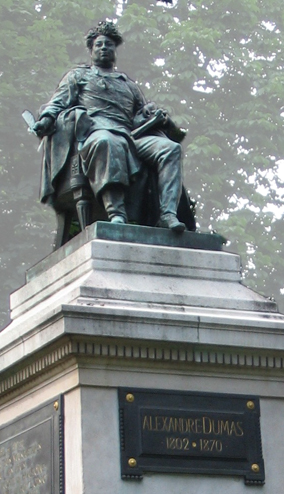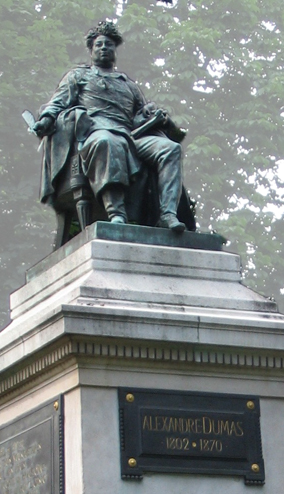
Here, in no particular order, are the top ten translations from France Revisited’s Translate This, D’Artagnan! competition.
It was a tough assignment, not only because we callously provided no context for understanding Pauline’s mindset but also because those sticky words “organisations impressionnables” are so annoyingly French-Cartesian.
Kudos to those 8 of the 10 that truly wrestled with the text. The other 2, as you’ll read, are the results of on-line translation software, included here as cautionary tales.
First the original, by Alexandre Dumas
Pauline avait une de ces organisations impressionnables comme il en faut aux artistes, et sans laquelle un voyage n’est qu’un simple changement de localités, une accélération dans le mouvement habituel de la vie, un moyen de distraire son esprit par la vue même des objets qui devraient l’occuper : pas un souvenir historique ne lui échappait ; pas une poésie de la nature, soit qu’elle se manifestât à nous dans la vapeur du matin ou le crépuscule du soir, n’était perdue pour elle.
Now the 10 translations

1. A valiant attempt by a Frenchman
Pawleen had one of these sensitive complexions that fit to the artists and of which the absence turns down a trip to a simple change of cities, an acceleration in the usual life motion, a mean of entertainment to one’s mind by the very sight of the objects that should interest it: not a single historical remind would escape to it, not a single poetic manifestation of nature, whether it should happen in the morning mist or in the dawn of the evening, was lost for it.
Translated by J-F.Q., Paris
2. Google this, of Artagnan
Pauline was one of these organizations impressionable as it takes to artists, and without which a trip is simply a change of locations, an acceleration in the movement of normal life, a way to distract his mind by the sight even objects that should occupy: not a historical memory escapes him, not a poetry of nature, it is manifestation of us in the steam of the morning or evening twilight, was lost for her.
Translated by Google
3. Dusk in Canada
Pauline had one of those sensitive constitutions, the kind artists have, without which travel is simply a change of place, an acceleration in the habitual movement of life, a way of distracting one’s mind by simply looking at the things that should otherwise engage it: no historical allusion escaped her; none of the poetry of nature, whether it revealed itself in morning mist or in evening dusk, was lost to her.
Translated by S.T., Montreal
4. Twilight in Philadelphia
Pauline had one of those impressionable dispositions essential to artists, without which a voyage is nothing but a simple change of location, an acceleration of life’s habitual movement, a way of distracting one’s mind even at the sight of those objects that ought to engage it; no historic memory escaped her, no poetry of nature, whether showing itself to us in the morning mist or in the evening’s twilight, was lost to her.
Translated by L.H.M, Philadelphia
5. A New York state of mind
Pauline reacted to life as it came, the way artists do; without that approach travel is simply a change of place, an acceleration in the routine of life, a way of distracting the mind by looking at objects that should stimulate it: no historical memory escaped her; none of the poetry of nature, whether revealed to us in the haze of morning or the dusk of evening, was lost to her.
Translated by J.L., New York City
6. From the streets of Chicago
Pauline, she a sensitive girl, got a psyche like gunpowder, like artists do. She not one of them people go traveling somewhere just to be in a different town and to get the heart pumping by filling the eyes with scenes that supposed to get the juices flowing; nothing escaped that girl; she open to all the songs of nature—she wake up with it, she go to sleep with it; she took it all in.
Translated by Jim, Chicago
7. From the pathways of cyberspace
Pauline had one of these impressionable organizations as it is necessary some for the artists, and without whom a voyage is only one simple change of localities, an acceleration in the usual movement of the life, a means of distracting its spirit by the sight even of the objects which should occupy it: not a historical memory did not escape to him; not a poetry of nature, that is to say that it appeared with us in the vapor of the morning or the twilight of the evening, was not lost for it.
Translated by systranet.fr
8. Mist in Columbia
Pauline’s approach had a sensitive touch as artists are wont to have and without which traveling is merely trading places, a stimulus in life’s continuum, a way to entertain one’s mind through the sight of objects that should nourish its reflection—no historical reference escaped her notice nor was any of nature’s mystique lost on her, whether we felt its presence in the morning’s mist or the evening’s dusk.
Translated by Jean-Marie, Columbia, SC
9. Fog here
Pauline had an impressive organization, the kind an artist would need, and without it, a trip would be nothing but a swapping of places, a sped-up version of the day-to-day, a way to distract the mind at the sight of these objects, objects that should capture her imagination: not a single historical memory escaped her, not a single poetry of nature, be it that it revealed itself to us as the morning fog or as the sunset at dusk, passed her by.
Translated by Anne-Louise
10. Übersetzt d’Artagnan!
Pauline war jemand von diesen beeindruckenden Organisationen großer Künstler für die eine Reise nur ein einfacher Ortswechsel, eine gewohnte Beschleunigung des Tagesablaufs ist, ein Mittel zur Ablenkung des Blicks auf das Immergleiche, das einen beschäftigt: Nicht, um eine historische Erinnerung einzufangen; auch nicht, um die Poesie der Natur zu erleben, wie sie sich uns im Morgen- oder Abend-Tau manifestiert, dies alles entging ihr.
Translated (into German) by E.K., Berlin

